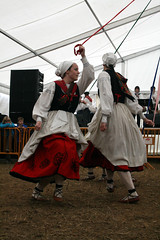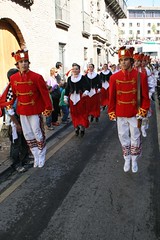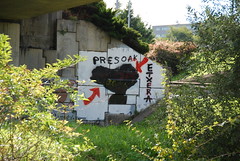This recipe comes to us via The Independent:
The Life Kitchen
Poulet Basquaise – chicken with peppers and smoky spices
Thursday, 30 October 2008
Thought to have evolved from a dish shepherds carried across the Basque hills in clay pots, this peppery chicken stew became the traditional Sunday lunch. You can vary the colours of the peppers, add the wonderful piquillos from the Basque Country or even their Spanish cousins. But the most important ingredient remains the piment d'Espelette, a distinctive smoky, spicy chilli that will have you hooked. If you can't get this, do your own thing and give smoked paprika a try – it's available in good supermarkets.
In a large soup pot, warm the olive oil on a medium to high heat, then brown the chicken really well on all sides.
When the chicken is fully browned, add the onions, garlic, bay leaf, thyme, tinned tomatoes and wine or water. Cover and bring just to the boil, then reduce the heat to a simmer. Cook for about 40 minutes.
Add peppers, olives and piment d'Espelette, then cover and simmer for another 20-30 minutes, until the chicken is fully cooked and the sauce has thickened a bit.
Season with salt and pepper. If you refrigerate the stew overnight, it will taste even better the next day.
Ingredients to serve 6
1-2 tablespoons olive oil
1 free-range chicken, approx 2kg, cut up, or 4 legs and 4 thighs
4-5 large onions, peeled and quartered
4 garlic cloves, peeled and roughly chopped
1 bay leaf
2 teaspoons fresh thyme, chopped
800g tinned whole peeled tomatoes
235ml dry white wine or water
2 red and 2 green peppers, sliced
1 large tin pitted green olives
1 teaspoon piment d'Espelette, plus extra to taste
Salt and freshly ground black pepper
From 'Trish's French Kitchen' by Trish Deseine
.... ... .











